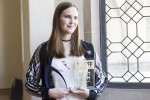Katie Speare filmed herself standing behind a sheet of Plexiglas smeared with makeup at age 16.
Sound clips from 1950s makeup commercials droned on while two hands scrubbed the makeup off the sheet. As the brown streaks washed away, more and more of Speare was revealed. She stared directly into the camera and wiped her face clean until both she and the screen were mostly makeup free.
In her first experimental film, “Mask,” Speare illustrated the pressures women face in regards to their appearance. With “Mask,” Speare, a first-year cognitive science student, launched her filmmaking career and her work has been featured at 31 film festivals.
Her short film “Once Upon a Time in Cambodia,” and music video “Astro, Naught” are nominated for the 2016 All American High School Film Festival, the largest high school film festival. During the festival, Speare’s work will be screened at the AMC theater in Times Square in October.
[Related: TFT alum wins student Emmy with thesis film “Zoya”]
Speare stumbled into her passion for filmmaking when she sought an easy elective as a high school sophomore and took a video production course. Not only did she end up enjoying the class, but she also found immediate success when “Mask” was accepted into 14 festivals.
Cheri Gaulke, Speare’s high school film teacher and mentor, guided Speare through all of her early projects, including “Mask.”
She said Speare’s work has always reflected a maturity and sophistication beyond her years.
“She took on issues, which, in the case of (‘Mask’), were very feminist,” Gaulke said.
While feminism has become more normalized as icons like Beyoncé have joined the movement, Gaulke said it was unusual for a high school girl to create a feminist video three years ago.
Speare also honed her filmmaking talents outside of the classroom setting with “Astro, Naught,” a music video she created for aspiring vocal artist Moollz.
For the video, Speare took inspiration from Vance Joy’s “Riptide” and visually illustrated each of the song’s nonsensical lyrics as literally as possible.
Speare wanted to create a layered effect by separating the foreground and background by a circle, said Cole Kawana, Speare’s classmate and collaborator. The technical aspects of the idea were difficult to produce on the editing software, so Speare spent hours of her weekends at their high school perfecting the video.
“I really like her creative vision,” Kawana said. “She’s always tackling really hard concepts.”
“Once Upon a Time in Cambodia” is a different sort of piece in which Speare documents the history of storytelling in Cambodia. Storytelling was used for evil in the form of propaganda for the Khmer Rouge, the regime responsible for the Cambodian genocide, as well as for good in the form of catharsis for the genocide survivors, Speare said.
[Related: Professor studies impact of Khmer Rouge regime in Cambodia]
Speare and a group of her classmates traveled to Cambodia in summer 2015 through a program that Gaulke helped organize at their high school. Each film student covered a different topic in regards to the country such as sex trafficking or art forms.
For her project, Speare interviewed and filmed locals who had survived the genocide as children.
“I remember one interview where I broke down because a guy was describing how … the first time he had a burger from McDonalds, he threw up because he wasn’t used to having so much food at once,” Speare said. “I was imagining my life and taking for granted, as a kid, just having a meal with my family.”
The documentary shows the horrors of the genocide with a shot of the Killing Tree, a site where children were beaten, now covered in colorful bracelets to honor those who were lost. It also captures the nation’s healing by featuring a clip of smot chanting, a traditional Cambodian singing practice and form of storytelling.
Encouraged by her high school success, Speare is finishing a narrative short film and plans on pursuing the film, television and digital media minor at UCLA.
“Taking my free time to get involved to see what resources I can use will be really beneficial to my work,” Speare said. “I think I can also help some other people who are up-and-coming in this field.”
